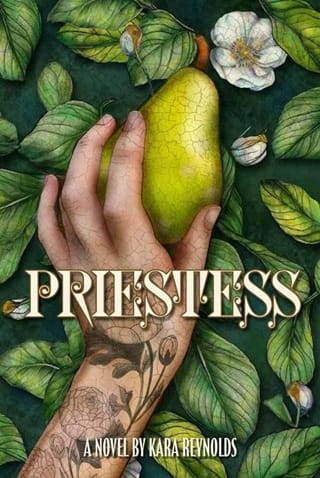51. Bleeding
Alric made every effort after that to be a considerate spouse.
He brought in a wooden chest for his clothing and boots and gave the entirety of the wardrobe to me.
I protested, but I could tell he wanted to be seen as accommodating and so I relented.
Days passed without my seeing him as he came to bed late and got up early, but I would find things in the room some mornings when I woke.
Once, it was decorative bookends carved in a dark wood in the shape of starfish.
Between them he had stacked both his books and mine.
Another day, he had had my vial of lightleaf refilled.
A third instance, I awoke to find, on the desk, a copper double-sided comb with teeth close together on one side and farther apart on the other.
Down the center was the engraving of a fern, much like the ones inked onto my forearm.
Whenever I tried to thank him, he grunted and changed the subject.
His father was right.
He was difficult.
But never again was his difficulty directed towards me.
He rose before dawn for the first phase of the Procurer trials.
Anyone who defeated him at a challenge was allowed to stay for the second phase, which he explained to me was a series of physical feats each man had to pass.
It sounded grueling to me and then he would be called into the king’s chambers or Jeremanthy’s offices after dinner to meet with the king, prince and heads of armies to discuss Perpatane’s attack on Sealmouth and how they had gotten away with it.
As it was a coastal town, it was part of the proud Tintar border that led out to the sea, The Flavored Three islands and an eternity past the horizon, the Cloudlands.
There was no evidence of which way the Perpatane army had gone, which led Hinnom’s war council to think they had gone seaward.
Their lost tracks were baffling and troubling.
Only Tintar and The Flavored Three had ships, made from Ruskar’s saltwater oaks.
Tintar had the only navy on the continent.
A Tintarian naval ship had been dispatched to Ruskar to investigate about timber being bought by any other country, but they had no explanation to offer as they only sold their oaks to Tintar, Sibbereen and Vyggia.
These issues and the Procurer trials did nothing but run my husband ragged.
Even on the tenth day of the week, days set aside for rest, he could not be found in our rooms.
I found myself wanting to know where he was and hoping he was at his family’s forge and not working.
As discreetly as I could, I would, through the earth temple antechamber window, watch him fight men half his age in the clay of the training yards.
Only four men had bested him thus far and they remained at the keep, awaiting all of the other contenders’ results.
The numbers kept thinning as boys gave up and went home.
One of his victors had drawn first blood in a sword fight and I came in from a late bath one night to find him trying to bandage his arm with one hand and his teeth.
I assisted him in this and reprimanded him for not visiting the keep’s infirmary.
I had a suspicion that medicine in Tintar was perhaps not as advanced as Eccleston, but he need not tend to his own wounds.
He stared at me in surprise as I scolded him about this, but I ignored him.
We rarely spoke if we saw each other, but we were agreeable.
Over the next moon, there were a handful of times we were both awake in bed.
I would ask him how the trials went.
He would give me short answers, exhaustion in his speech, but then solicitously ask about my day in the earth temple.
Cian finally decided to explore my penchant in a straightforward approach as opposed to me reading the ‘The Remarkable Loaming of Our Goddess’ a second time looking for a connection.
I was accompanying him and Hazel on more and more excursions outside Pikestully as they visited farms to settle land disputes, read soil, pray over properties, and once dissected a stillborn lamb to ascertain what had caused the death.
I saw little evidence of magic, other than the self-writing slate in Cian’s office since my arrival in Tintar and I often wondered if they were not holding onto their mythology.
The history of Tintar Cian had given me was intriguing because it read like a bedtime tale, stories of ancient people coming forth from caves to command oceans and mountains by merely spilling blood.
On one such excursion, he asked that I, using the whetted point end of the sagaris, lightly prick my right palm and bleed into the ground.
We were at an apiary and the beekeeper, swathed in linens and carrying a smoking brazier, was concerned about the health of his bees.
Hazel and another earth priest were inspecting dead bees on the ground and cutting open a section of honeycomb.
Cian pulled me into an apple orchard bordering the apiary.
After inflicting a stinging pain in my palm, I got to my knees, thinking of that day I had seen my husband do it at the Sibbereen horse farm.
I asked Cian if I should pray and he told me I should but that The Farthest Four, while having many scriptures written about each, did not have prayers to memorize.
This was not how I had grown up, having memorized countless passages written about and by Rodwin, as well as liturgies to recite in church services.
“What do I say?”
I asked, feet tucked under my rear, grateful I had worn the Tintarian black dress and not my celadon as I knelt in dirt and grass.
But the black cotton dress had sleeves down past the elbow and I was sweating and bees were everywhere on this property.
I was irritable.
My right palm stung and bled.
Cian, without his archpriest robe, in a simple tunic and brown breeches smiled at me.
“Whatever you want to say to her.
She is listening, Edie.”
I stared at the ground.
I had never had any faith.
I had tried, as a youth, to believe in Rodwin and almost had.
But it had been to impress my parents and I was seen through, accused by them of a performative faith.
This had resulted in weeping, arguments and ultimately, punishment.
I had never been good enough for the church.
And then I thought of that night in Nyossa, the night I had seen one stone stack itself on top of another.
I had never let myself think on those glimpses or the dreams I had of tall pillars of stones or small stacks of pebbles.
But I did now and my words came back to me.
I need help.
I do not know where to go, and I do not know who to pray to anymore.
I turned to Cian and bashful, said, “May I be alone?”
“Of course.
I do not know why I am standing here,”
he said, shaking his head at himself and walked away towards the field of hives.
“Good afternoon,”
I began, once he was farther away.
I laughed a little to myself.
“Where to begin.
Well, I was raised to believe that you and your fellow deities were wicked.
A part of me is terrified of this prayer.
I fear the spirit of Rodwin will come from behind an apple tree and drag me to his hell. And—”
here my voice quaked “I fear the box.
I will always fear that box.
I still cannot believe my own godsdamn husband put me in it.
But you are not a punishing goddess.
Or not deliberately.
Life is hard enough and that is what the books I have read about you tell me.
So, Mother, I do not know how to pray without first begging for forgiveness.
How does one petition an ambivalent god? I just don’t know.
I don’t know what I am doing at all.”
My voice broke.
I hated how prone to tears I was.
I had always been an easy crier.
I had learned how to swallow the lump in my throat and blink away the wetness in my eyes, but only in front of others.
Alone, in Eccleston, I could cry reading poetry or if I heard music through my window.
And here I was, yet again, alone in an orchard, bleeding into the ground, asking a deity I was not sure existed, what I should do.
“I don’t know what I am doing at all,”
I repeated.
“I am married to a stranger.
I myself am a stranger in a strange land.
I am, honestly, quite sure that Cian is laboring under a miscalculation and I do not have magic, and that is somehow incredibly humiliating to me, which is absurd as I have never claimed to have magic.
I do not even know if I believe in it.
And, finally, lady, I find it cruel that I am to pray to a goddess whose very essence is maternal and is the alleged mother of all and I, a woman who cannot get with child.
Is that not just the least bit cruel?”
Cian collected me an hour later.
My cheeks were still damp, and he did not say anything about it but put his hand on my arm to guide me back to the horses, and I thought him a compassionate man.
“I like your necklace,”
he said, his eyes on the hollow of my neck.
I reached up to touch it.
“Alric gave it to me.”
Cian nodded, an enigmatic look on his face.
At dinner, Mischa informed us of the continued frustrations the Tintarian armies were having with tracing the Perpatanian attack.
Catrin told us about the snideness of some of the ladies of Modwenna’s women and we all commended her on her grace.
River went on about all the different breeds of fish that existed in the Tintarian Sea while her lover contentedly ate one of the discussed fish.
Quinn had seemed, to me, to have withdrawn into herself and when I had asked her later on if she was upset still, she had waved me away, thanking me and dismissing my inquiry.
Having a desire for privacy for my Perpatanian life, I did not press her.
Helena and Maureen had painted a dark green base layer in the throne room on which to paint rocks and waves and ominous shark fins.
Helena said she was toying with painting the outlines of mermaids in a particularly glimmering, but watery blend of the malachite so that they would only be visible when sunlight hit those parts of the mural.
“Of course, it would only apply to the opposite side of the room,”
she mused aloud.
I glanced at Mischa, also watching Helena.
We had, one morning when it was just the two of us in the baths, discussed how our friend fared after her rape in Nyossa.
There was nothing we could do but be her friends, but it distressed us to know of the invisible injury she bore.
Now, she seemed preoccupied with her work.
Her daughter had taken to Tintarian life quickly, as had Catrin, in the way that only the young can adapt and live in the moment.
 Fullepub
Fullepub 



